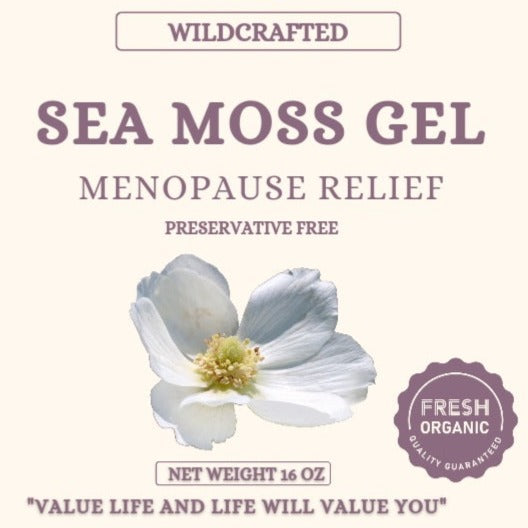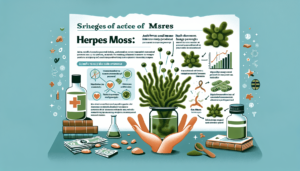The Best Fluffy Pancakes recipe you will fall in love with. Full of tips and tricks to help you make the best pancakes.

Are you looking for a natural remedy to alleviate the symptoms of menopause? Well, look no further because sea moss might just be the answer you’ve been searching for. In recent years, this nutrient-rich seaweed has gained significant attention for its potential to support women during the transitional phase of menopause. Packed with essential vitamins and minerals, sea moss is believed to have properties that can help balance hormones, reduce hot flashes, and promote overall well-being. So, if you’re curious to know more about the benefits of sea moss for menopause, keep reading!

Free Sea Moss Sexual Health Guide
What is sea moss?
Sea moss, also known as Irish moss or carrageen moss, is a type of red seaweed that grows along the Atlantic coastlines of Europe and North America. It has been used for centuries in traditional medicine and culinary practices due to its numerous health benefits. Sea moss contains a rich blend of vitamins, minerals, and antioxidants, making it a valuable addition to the diets of those looking to improve their overall health and well-being.
Overview of sea moss
Sea moss is a low-calorie food that is packed with essential nutrients. It is a great source of vitamins A, E, and K, as well as various B-vitamins. Additionally, sea moss contains minerals such as iodine, magnesium, calcium, and selenium, which are important for maintaining optimal health. Not only is sea moss nutrient-dense, but it is also low in fat and high in dietary fiber, making it a great addition to a balanced diet.
Nutritional value of sea moss
Sea moss is prized for its rich nutritional content. It is particularly high in iodine, a mineral that is essential for thyroid health and hormone regulation. Sea moss also contains potassium, which is important for maintaining healthy blood pressure levels. Other minerals found in sea moss, such as calcium and magnesium, are vital for strong bones and teeth. Additionally, sea moss is a good source of antioxidants, which help protect the body against damage from free radicals.
Menopause
Menopause is a natural biological process that occurs in women, typically in their late 40s or early 50s, marking the end of their reproductive years. It is characterized by a decline in the production of reproductive hormones, particularly estrogen and progesterone. This hormonal shift can lead to a variety of physical and emotional symptoms.

Definition of menopause
Menopause is defined as the absence of menstrual periods for twelve consecutive months. It is a normal part of a woman’s aging process and usually occurs between the ages of 45 and 55. Some women may experience menopause earlier or later due to various factors such as genetics, lifestyle, and underlying medical conditions.
Symptoms of menopause
The symptoms of menopause can vary from woman to woman. Common physical symptoms include hot flashes, night sweats, vaginal dryness, and sleep disturbances. Women may also experience emotional symptoms such as mood swings, irritability, and difficulty concentrating. These symptoms can severely impact a woman’s quality of life, leading many to seek remedies to alleviate their discomfort.

Effects of menopause on women
Menopause can have a profound impact on a woman’s body and overall well-being. The decline in estrogen levels can result in changes in bone density, leading to an increased risk of osteoporosis. Additionally, the hormonal fluctuations during menopause can contribute to cardiovascular changes, such as an increased risk of heart disease. Menopause can also affect a woman’s mental health, with some women experiencing anxiety, depression, and decreased libido.
Natural remedies for menopause
With the increasing interest in natural remedies and a more holistic approach to healthcare, many women are turning to alternative treatments for menopause symptoms. Natural remedies offer the potential for relief without the potential side effects associated with hormone replacement therapy (HRT). These remedies often focus on providing the body with the nutrients and support it needs to navigate this transitional phase of life.
Benefits of natural remedies
Natural remedies can offer a range of benefits for women experiencing menopause. They can help alleviate symptoms such as hot flashes, night sweats, and mood swings, providing a more balanced and comfortable transition. Additionally, natural remedies tend to have fewer potential risks and side effects compared to conventional hormone therapies. By focusing on holistic approaches, women can take an active role in managing their menopause symptoms.
Potential benefits of sea moss for menopause
Sea moss has gained attention as a potential natural remedy for menopause symptoms due to its nutrient-rich composition. The various vitamins and minerals found in sea moss may help alleviate some of the discomfort associated with menopause and support overall well-being.

Sea moss as a natural remedy for menopause
Sea moss is believed to have adaptogenic properties, meaning it can help the body adapt to stressors and achieve a state of balance or homeostasis. Menopause is a time of significant hormonal changes, and sea moss may provide support in maintaining hormonal balance naturally. By promoting hormonal equilibrium, sea moss may alleviate some of the symptoms associated with menopause.
Nutrients in sea moss that may help with menopause symptoms
Sea moss contains several essential nutrients that can be beneficial during menopause. For example, iodine is important for healthy thyroid function and hormone regulation. Adequate levels of iodine can help ease symptoms such as hot flashes and mood swings. Sea moss is also a good source of calcium and magnesium, which support bone health and may reduce the risk of osteoporosis. Additionally, sea moss contains antioxidants that can help combat oxidative stress and support overall well-being.
Importance of hormonal balance during menopause
Hormonal balance is crucial during menopause, as the decline in estrogen levels can lead to a range of symptoms. Estrogen plays a key role in various bodily functions, including regulating body temperature, maintaining bone density, and supporting mood stability. Therefore, maintaining hormonal balance is essential for minimizing the disruptive effects of menopause on a woman’s body and overall well-being.
Role of sea moss in maintaining hormonal balance
Sea moss contains nutrients that may promote hormonal balance during menopause. As mentioned earlier, sea moss is a rich source of iodine, which is vital for thyroid health and hormone regulation. The thyroid gland produces hormones that help control metabolism, body temperature, and mood. By providing the body with adequate iodine, sea moss may support the optimal functioning of the thyroid gland and promote hormonal balance.
Reduced risk of osteoporosis during menopause
During menopause, the decline in estrogen levels can lead to a loss of bone density, increasing the risk of osteoporosis. Osteoporosis is a condition characterized by porous and fragile bones, making them more susceptible to fractures. Including sea moss in the diet may help support bone health during this critical phase of a woman’s life.
Potential role of sea moss in promoting bone health
Sea moss is a good source of calcium and magnesium, both of which are essential for maintaining strong and healthy bones. Calcium is a cornerstone mineral for bone health as it is involved in bone formation and maintenance. Magnesium, on the other hand, helps with calcium absorption and supports the structural integrity of bones. By providing the body with these vital minerals, sea moss may potentially help reduce the risk of osteoporosis during menopause.
Impact of menopause on mood
Menopause can have a significant impact on a woman’s mood and emotional well-being. The hormonal fluctuations during this phase can lead to irritability, anxiety, and depression. These emotional changes can disrupt daily life and impact relationships, making it important to find ways to support mood regulation during menopause.
Possible mood-regulating properties of sea moss
Sea moss contains several nutrients that are associated with mood regulation. For instance, vitamin D, which is found in sea moss, has been linked to improved mood and reduced risk of depression. Iodine, another nutrient abundant in sea moss, is essential for the production of neurotransmitters that regulate mood, such as serotonin. By providing these mood-supportive nutrients, sea moss may help alleviate mood swings and promote emotional well-being during menopause.
Changes in digestion during menopause
Menopause can also bring about changes in digestion. Some women may experience digestive issues such as bloating, constipation, and indigestion. These changes can be attributed to the hormonal fluctuations and metabolic changes that occur during menopause.
Potential benefits of sea moss for digestive health
Sea moss is rich in dietary fiber, which is essential for maintaining a healthy digestive system. Fiber helps regulate bowel movements, preventing issues such as constipation. By including sea moss in the diet, women experiencing digestive issues during menopause may find relief and support optimal digestive health.
Increased risk of cardiovascular disease during menopause
During menopause, women may experience an increased risk of developing cardiovascular diseases such as heart disease and stroke. The decline in estrogen levels may contribute to unfavorable changes in cholesterol levels and blood pressure, increasing the risk of cardiovascular issues.
Potential cardiovascular benefits of sea moss
Sea moss contains antioxidants, which help reduce inflammation and may support cardiovascular health. Additionally, many of the minerals found in sea moss, such as potassium, magnesium, and calcium, are important for maintaining a healthy heart and blood vessels. By including sea moss in the diet, women going through menopause may potentially reduce their risk of developing cardiovascular diseases.
Other potential benefits
In addition to the specific benefits mentioned above, sea moss may offer other advantages that can improve overall health and well-being.
Skin health
Sea moss is often used in skincare products due to its potential benefits for the skin. It contains collagen-promoting compounds that may enhance skin elasticity and promote a more youthful appearance. Additionally, sea moss is believed to have anti-inflammatory properties, which may help soothe various skin conditions, including acne and eczema.
Weight management
Weight gain is a common concern for many women during menopause. The hormonal changes can lead to an increase in abdominal fat and a decrease in muscle mass. Sea moss is low in calories and high in dietary fiber, making it a valuable addition to a weight management plan. The fiber content helps promote feelings of fullness, reducing the likelihood of overeating.
Energy levels
Fatigue and low energy levels are common complaints during menopause. The nutrient-rich composition of sea moss, including its B-vitamin content, can contribute to increased energy levels. B vitamins play a crucial role in energy production and metabolism, and their adequate intake can help combat fatigue and maintain vitality.
In conclusion, sea moss offers a range of potential benefits for women going through menopause. From hormonal balance and bone health to mood regulation and digestive support, sea moss provides a natural and nutrient-rich option for alleviating menopause symptoms. With its abundance of vitamins, minerals, and antioxidants, sea moss may be a valuable addition to a holistic approach to managing menopause and promoting overall health and well-being. However, it is always important to consult with a healthcare professional before incorporating new supplements or natural remedies into your routine.






